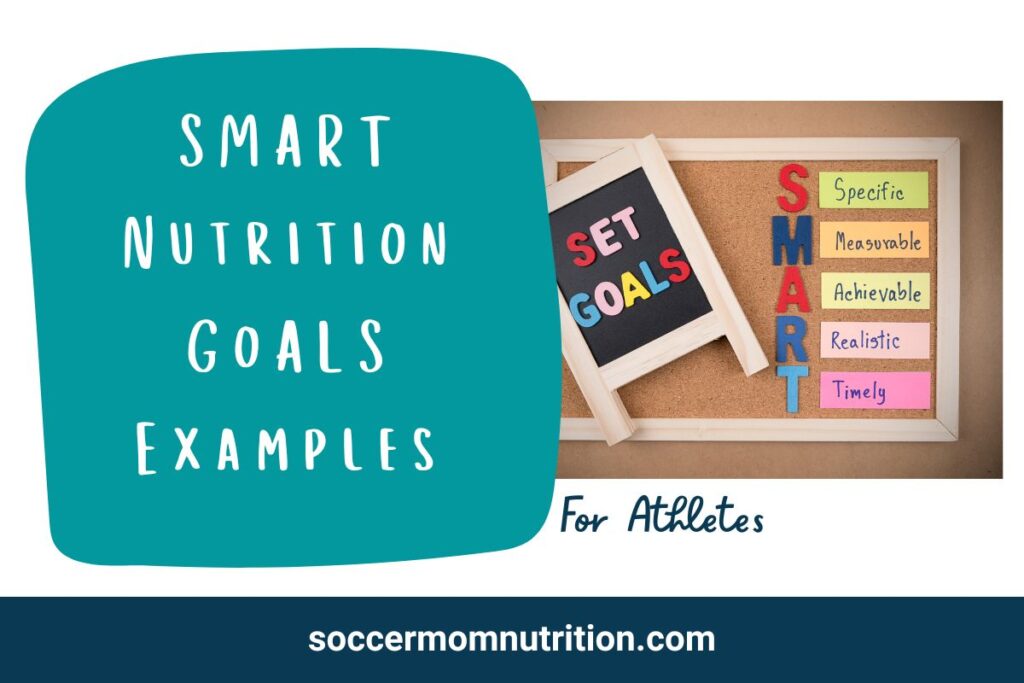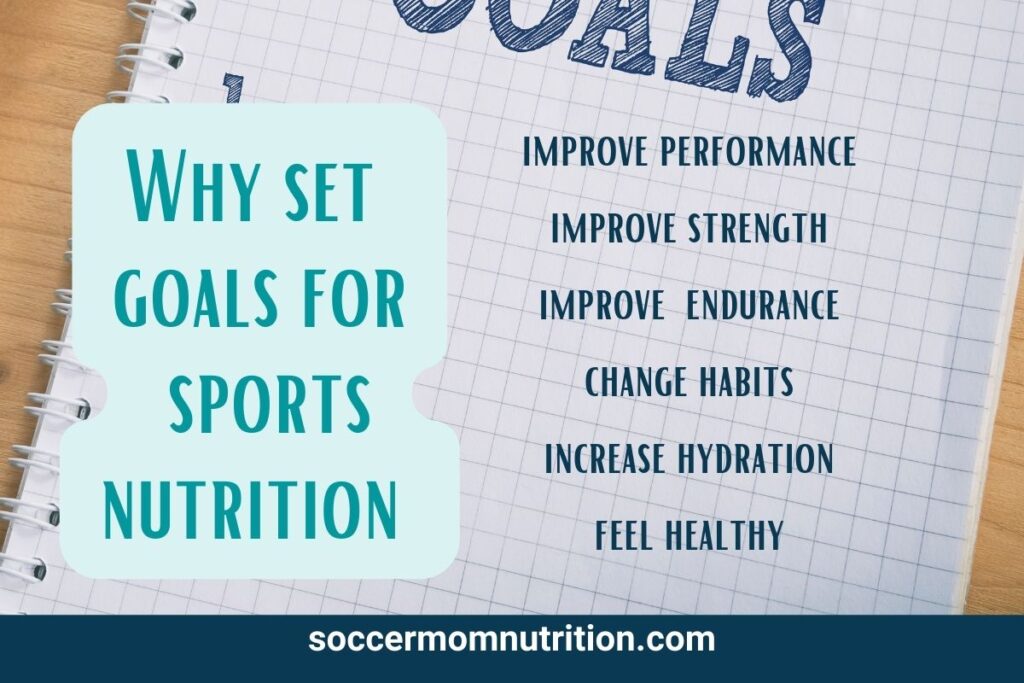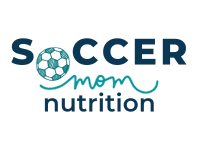SMART Nutrition Goals Examples [Ultimate Tips]
In this blog post, we will explore 30 SMART nutrition goals examples for athletes. You can use these to optimize their nutrition and improve your overall performance and health.
When it comes to nutrition SMART goals can help athletes identify their dietary needs, track their progress and stay motivated.
Whether you’re a beginner or a seasoned athlete, these smart nutrition goals examples provide a starting point to take your sports nutrition to the next level.
Achieving optimal nutrition can be challenging, especially for athletes who have busy schedules and high energy demands.
But setting SMART nutrition goals can help you overcome these challenges and also stay on track towards achieving your performance and health objectives. (1)

Please note that this article contains affiliate links. If you click one of these links and make a purchase, we may earn a commission. As an Amazon Associate, we earn from qualifying purchases.
What are SMART goals
SMART goals are Specific, Measurable, Achievable, Relevant and Time-bound objectives that provide a clear and structured approach to goal setting.
Using the SMART goal technique helps you to build a plan that is achievable because it sets a framework for success.
Once you’ve set your SMART goals, the next key component is to develop an action plan to help you achieve the goal. What are the concrete actions you plan to take to help you achieve that goal.
Next, you need a plan to monitor your progress so that you can celebrate your success or make adjustments to ensure you are moving towards achieving your goal.
You can use this SMART goal framework for both short and long term goals. This can help you build long lasting habits.
SMART nutrition goals examples with action plan
Here’s a smart nutrition goal example with an action plan to help you set your own goals.
Eat a pre-game meal with lean protein, complex carbohydrates and healthy fats at least three hours before every game for the next two months to optimize energy levels and improve performance.
This goal is:
Specific. You are eating a pre game meal to optimize energy.
Measurable.Track whether you consumed the pre-game meal.
Achievable. With meal planning and prep you’ll have the right foods available.
Relevant. This goal will help optimize energy and also improve your sports performance.
Time-bound. You’ll give yourself two months.
The action steps to achieve this goal could include:
- planning and preparing for pre-game meals in advance
- shopping for and preparing the necessary ingredients
- setting reminders to eat the pre-game meal at the appropriate time
Additionally, log your meals, then review your progress every week to make any necessary adjustments. Celebrate your success and continue to move towards achieving your goals.
30 SMART nutrition goals examples for athletes
- Increase protein eaten at each meal to 15-20 grams per snack and 25-30 grams at meals, for the 21 days to improve muscle recovery and time to recovery.
- Consume 2 servings of green leafy vegetables each day for the next 2 weeks to increase fiber intake and anti inflammation benefits.
- Reduce sugary soda consumption to 1 per week for the next 3 months to improve hydration and reduce sugar and empty calories intake.
- Aim to eat a balanced breakfast containing protein, complex carbs and healthy fats every day for the next two weeks to improve energy levels throughout the day.
- Eat at least 25 grams of fiber per day for the next month to improve digestive health.
- Limit processed food consumption to once per week for the next 2 months to reduce inflammation and improve nutrient intake.
- Increase water intake to 64-80 ounces per day for the next month to improve hydration, improve recovery and feel less fatigue when playing.
- Incorporate 1 serving of healthy fats such as nuts, seeds, or avocado into each meal for the next 2 weeks to support performance and brain health.
- Replace refined grains with whole grains for the next month to improve nutrient density and gut health.
- Eat at least 5 different colors of fruits and vegetables each day for the next month to increase nutrient diversity, fiber intake and anti inflammatory benefits.

- Incorporate a post-workout recovery meal containing protein and carbohydrates within 30 minutes of exercise for the next month to support muscle recovery.
- Add fermented foods such as low fat greek yogurt or kefir to each meal for the next 2 weeks to improve gut health.
- Plan meals and snacks in advance for the 3 weeks to ensure adequate energy intake to perform well and for recovery.
- Increase omega-3 fatty acid intake by consuming fatty fish once per week for the next 2 months to improve brain function and lower inflammation.
- Replace sugary snacks with a piece of fruit for the next month to reduce sugar intake and improve fiber, vitamin and mineral intake.
- Aim to consume a variety of plant-based protein sources such as beans, lentils, and tofu for the next month to reduce animal protein intake and improve nutrient diversity.
- Increase magnesium intake by consuming leafy green vegetables, nuts and seeds for the next 2 weeks to support energy production and reduce muscle cramps.
- Consume a high-protein snack such as low fat greek yogurt or cottage cheese before bed for the next month to support muscle recovery during sleep.
- Add a pre game snack containing carbohydrates and a small amount of protein before games for the next month to improve energy levels and performance.
- Pack a halftime snack for every practice and game for the next two weeks to improve energy levels and maintain blood sugar levels.
- Stock my locker and gear bag with healthy snacks like protein bars, nuts and fruit for the next month to avoid unhealthy snacking and meet daily energy needs.
- Eat a balanced meal containing protein, complex carbs and healthy fats the night before every game for the next three months to optimize energy levels and improve performance.
- Aim to eat 4-6 meals and snacks throughout the day for the next two weeks to meet energy needs for optimal performance.
- Add a vegetable to every meal for the next month to increase nutrient density and fiber intake.
- Consume at least 30 grams of carbohydrates within 30 minutes of practice to top off muscle glycogen stores and improve endurance.
- Eat a high protein snack before bedtime containing casein protein to improve muscle recovery during sleep for the next month.
- Add one new healthy recipe to my weekly meal plan for the next month to improve nutrient diversity and increase enjoyment of healthy eating.
- Eat a post-workout snack or meal that includes a 3:1 ratio of carbohydrates to protein for the next two months to improve glycogen replenishment and support recovery.
- Replace refined carbohydrates with complex carbohydrates such as quinoa, sweet potatoes and brown rice at meals for the next month to stabilize blood sugar levels and improve energy throughout the day..
- Prepare a week’s worth of healthy, carbohydrate and protein-rich grab-and-go snacks every Sunday for the next two months to support energy needs throughout the day.
Final thoughts
Remember to make your nutrition goals specific, measurable, achievable, relevant, and time-bound, and to take action steps to achieve them.
Use these SMART nutrition goals examples as a starting point to create your own goals to optimize your nutrition and sports performance.
Join our mailing list and get our FREE Pre-Activity Fueling Guide.
Stephanie Magill, MS, RD, CD, FAND has over 22 years of experience in public health and nutrition. As a performance registered dietitian nutritionist, Stephanie specializes in sports nutrition and provides simple and actionable information so that athletes can be well fueled for high performance on and off the field. Stephanie has a Master’s Degree in Nutrition and is a Fellow of the Academy of Nutrition and Dietetics.

